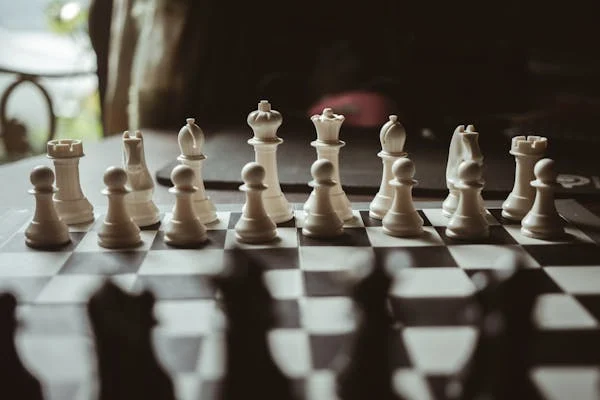Chess is not just a game. It’s a way to build strong minds. It helps kids learn how to think clearly, solve problems, and stay calm under pressure. In cities like Doha, Qatar, where education and personal growth are highly valued, more and more families are looking for good chess coaching. They want their children to become smart thinkers and confident decision-makers.
Online Chess Training
Landscape of Chess Training in Doha and Why Online Chess Training is the Right Choice
Online chess training is more than just logging into a video call. It’s a full ecosystem—a living, breathing classroom that works smarter, moves faster, and builds sharper minds. For families in Doha and beyond, it offers not just convenience but a totally new way of learning that feels current, flexible, and incredibly effective.
At the same time, for businesses and chess academies looking to stay ahead, moving online is not just an option—it’s a necessary shift. The way education is delivered has changed forever, and chess is no exception. The most successful training systems of the next decade will be digital-first.
So what exactly makes online chess training so powerful? And how can families and businesses make the most of it?
Why Families Are Choosing Online Chess
First, let’s talk about students and parents. In Doha, traffic can be unpredictable. Schedules are packed. Families juggle school, sports, homework, and family time. Driving across town to a chess class three times a week just isn’t always realistic. Online training removes that stress.
But convenience is just the beginning.
Online classes are more personalized. Most platforms, especially high-quality ones like Global School of Chess, offer smaller class sizes or even private sessions. This means your child gets the attention they need. They don’t sit quietly while the coach helps someone else for 20 minutes. They learn, ask, and grow—every minute counts.
Lessons are structured and trackable. Unlike many offline setups, good online academies use curriculums. They map out what your child will learn in Week 1, Week 4, or Week 10. This isn’t just helpful for the student—it’s peace of mind for parents.
Learning is more flexible. Missed a class? No problem. Many sessions are recorded. Students can rewatch lessons or take a make-up class. They can also learn from anywhere—in the living room, at grandma’s house, or even on holiday.
Resources are richer. Online tools allow students to play practice games, solve puzzles, analyze positions, and even get homework with one click. This kind of blended learning—video + board + interaction—helps young minds stay engaged and challenged.
Real World Skills Beyond the Board
Here’s where it gets even more interesting.
Online chess helps build real-world skills that go way beyond the game.
Digital communication. Your child learns how to speak up, ask questions, and follow along in a virtual space. That’s a huge advantage in today’s tech-based world.
Time management. With homework, reminders, and self-paced materials, kids learn how to manage their learning. That’s a skill that helps in school, college, and life.
Focus and discipline. Online classes, especially when interactive, train the brain to stay sharp without distractions—something even adults struggle with.
So, when a parent chooses online chess, they’re not just investing in a game. They’re preparing their child for a smarter, sharper, more future-ready life.
For Chess Businesses: Online is Your Growth Engine
Let’s shift gears.
If you run a chess academy or are a coach in Doha, this next part is for you.
Moving online can feel scary. It’s different. It’s digital. And maybe you’re used to face-to-face teaching. But here’s the truth: the biggest growth opportunities in chess today are online.
Why?
Reach. Offline academies are limited to one neighborhood, maybe a city. Online academies can reach students across time zones, countries, and continents. That’s not hype—it’s a real growth strategy.
Scalability. With the right tools, you can teach more students without needing more classrooms or chairs. You can run multiple classes, hire remote coaches, and offer lessons around the clock.
Lower Costs. Say goodbye to rent, utility bills, and classroom maintenance. All you need is a good camera, a strong internet connection, and some tech tools.
Data and feedback. Online training lets you track attendance, lesson completion, homework results, and progress over time. You get real metrics—not just “the student is doing okay.”
Actionable Steps to Launch or Improve Your Online Chess Program
Now let’s get practical. Whether you’re already online or just starting, here’s how to make it work like a pro.
1. Build a real curriculum. Don’t “wing it.” Map out your classes for each level. Define what a beginner, intermediate, or advanced student should learn each month. Use PDFs, video breakdowns, and worksheets to support lessons.
2. Train your coaches to teach online. Playing well is not enough. Coaches must learn how to explain on Zoom, use online boards (like Lichess or Chess.com), manage chat questions, and give clear feedback.
3. Create student dashboards. Set up a system where students and parents can track what’s been learned, what’s next, and where to improve. This builds trust and keeps everyone motivated.
4. Use interactive platforms. Don’t just teach with slides. Use tools that allow students to drag pieces, solve puzzles, or analyze games in real-time with the coach.
5. Offer flexible packages. Give options—group classes, private lessons, tournament prep, weekend workshops. The more flexible you are, the more families will find a plan that works for them.
6. Host online tournaments. These keep students excited and give them a chance to test what they’ve learned. Make the tournaments fun, regular, and global if you can.
7. Collect reviews and feedback. After every few weeks, ask parents and students how things are going. Adjust quickly. Happy families refer others.
8. Build community. Use WhatsApp, Discord, or private groups to connect students. Share puzzles, highlight achievements, and keep the energy alive outside class hours.
From Local to Global—Why It Works
The truth is simple: online training turns local businesses into global leaders.
Take the Global School of Chess as an example. What started as a single online offering is now a growing network of students from over nine countries. And it’s not by accident. It’s by building a real system that combines strong coaching, clear curriculum, modern tech, and deep human connection.
Your chess academy in Doha can do the same. The market is ready. Families want flexible, high-quality, affordable chess coaching. And they don’t care if the coach is in West Bay, Wakrah, or Warsaw—if the training is good, they’ll sign up.
How Global School of Chess is The Best Choice When It Comes to Chess Training in Doha
Let’s talk about what makes the Global School of Chess special. First, it’s not just an online school. It’s a community. Students from more than nine countries take part. Classes are live. Coaches are experts. Every student gets a learning plan that fits them. That means your child doesn’t just learn moves—they learn how to think.
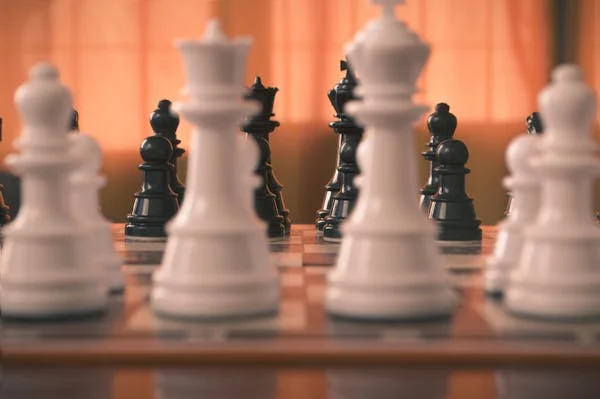
Here’s what your child gets at the Global School of Chess:
- Live, interactive lessons with top coaches.
- A structured learning path. No guesswork. No random lessons.
- Homework after every class to reinforce what was taught.
- Bi-weekly tournaments to test their skills.
- Private coaching for students who want to go deeper.
It’s like sending your child to the best chess school in the world—without leaving your home in Doha.
Even better, it’s very easy to try it out. Parents can book a free trial class to see how it works. No pressure. Just pure learning.
Want to see it in action? Book a free trial class here
And now, let’s look at the other side—the offline world.
Offline Chess Training
Offline chess training has a long history. It’s how most of today’s grandmasters started their journey—sitting across a board, moving pieces by hand, listening to a coach in real-time. There’s a nostalgic charm to it.
But in today’s fast-moving, digital-first world, traditional chess schools face big challenges. And if you’re a business owner in this space, understanding these shifts is crucial.
One strength of offline training is physical interaction. Students can pick up body language, see how opponents react, and engage socially. These soft skills are valuable. For younger kids, especially, being in a classroom setting can build social confidence. Some students also respond better when they’re physically present with a coach.
However, success in offline chess coaching requires more than just showing up with a board. Businesses must be extremely organized and resourceful. Relying solely on board demonstrations or verbal explanations won’t cut it anymore. Today’s students expect more. They want clarity, structure, and feedback. And parents want proof of progress.
Strategic Tips for Offline Chess Academies:
Standardize the curriculum. Many offline coaches just teach from experience—whatever they feel like that day. This doesn’t work long term. Develop a set curriculum with weekly goals. Print lesson plans. Share them with parents. Structure builds trust.
Blend in digital tools. You don’t need to be fully online, but you must be tech-aware. Use tablets to review games. Send puzzles over WhatsApp. Host an occasional online blitz night. These touches show you’re evolving.
Offer parent feedback reports. Offline training often leaves parents in the dark. Fix that. Use a simple monthly feedback sheet or even a short email update. It shows care and professionalism.
Create a club culture. Make your academy more than a place to learn. Host monthly tournaments. Celebrate student achievements. Build community. The stronger your chess culture, the longer families stay.
Offline chess training still holds value—but it has to evolve. With a smart approach, traditional academies can still compete by being more structured, tech-friendly, and community-focused.
Drawbacks of Offline Chess Training
Offline chess training might look appealing at first—face-to-face contact, live board play, and classroom energy. But when we dig deeper, especially from a strategic point of view, serious gaps become clear. These gaps matter not just for parents and students, but also for businesses trying to stay relevant in today’s learning landscape.
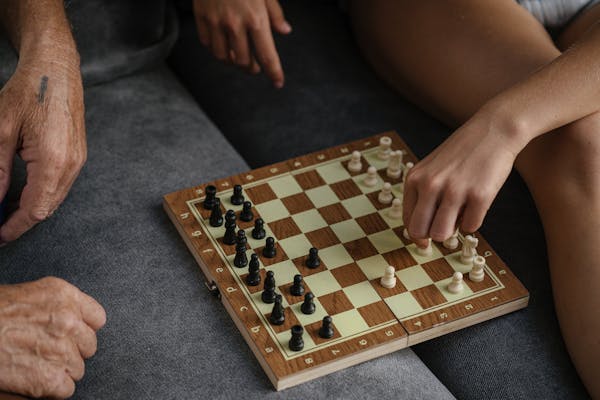
For parents, one of the biggest challenges is time management. Driving to class, waiting during lessons, dealing with traffic—all of this eats up valuable family time. If you have more than one child or a busy work schedule, this becomes even harder. That time could be used for homework, family meals, or rest.
Another issue is inconsistency. In many offline setups, classes get canceled due to coach availability, holidays, or logistics. Kids lose momentum. There’s no continuity. And without digital support (like recorded lessons or online resources), there’s no way to catch up.
Environment also matters. Many offline academies operate in shared spaces or noisy environments. This distracts students, lowers concentration, and reduces learning quality. Unlike a focused online setup, it’s hard to control the learning atmosphere.
Now for chess businesses—here’s the harsh truth. Relying only on in-person teaching limits your growth. Your income is tied to how many people can physically show up. Rent, electricity, and staff costs eat into your earnings. You’re also vulnerable to seasonal dips—holidays, weather, or health events like pandemics can shut things down fast.
Actionable Advice for Chess Businesses Still Offline:
- Start a hybrid model: Keep some offline classes but add an online option. You’ll reach more students without more rent.
- Digitize your materials: Create PDF lesson plans, video breakdowns, and homework sheets. These help your offline students stay engaged even between classes.
- Train staff in tech tools: Help your coaches get comfortable with Zoom, Lichess, screen sharing, and online boards. This prepares your team for the future.
Offline chess can still have its place. But without digital strategy, it’s hard to scale or survive. Today’s learners—and their families—demand flexibility, structure, and value. And only online training can consistently deliver all three.
Best Chess Academies in Doha, Qatar
Global School of Chess
Now let’s talk about the number one chess academy—not just in Doha, but across the globe when it comes to online chess training.
The Global School of Chess isn’t just a school. It’s a movement. A warm, welcoming place where young minds learn to think sharper, stay focused longer, and build real confidence. It’s built around one goal: helping every student, no matter where they start, become the best version of themselves—on the board and off it.
What Makes It So Special?
Personalized coaching. Every student is different. Some learn fast, some take time. That’s why Global School of Chess doesn’t teach everyone the same way. Each student gets a plan that’s made just for them. Their strengths, their pace, their learning style—it’s all part of the process.
Live, interactive classes. These aren’t boring videos or YouTube lessons. These are real-time classes with real coaches. Students can ask questions. Get instant feedback. And connect with others from around the world.
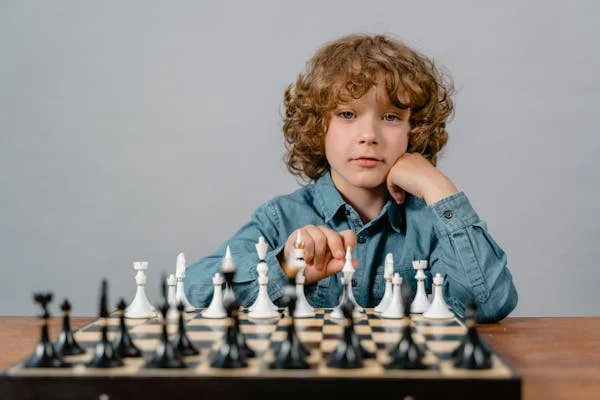
Certified coaches. All the coaches at Global School of Chess are FIDE-certified. That means they are trained not just to play well—but to teach well. They know how to explain ideas in simple ways. They know how to make learning fun. And they really care.
Real curriculum. No more jumping from topic to topic. The learning path is clear. From beginner to advanced, every student follows a structured journey. They learn openings, middlegames, endgames, tactics, strategy, and so much more.
Tournaments. Every two weeks, students get to test their skills in online tournaments. It’s exciting. It’s competitive. And it’s one of the best ways to grow as a chess player.
Life skills. Chess isn’t just about kings and queens. It’s about patience. Focus. Smart thinking. Confidence. These are the same skills your child needs in school and life—and they get to build them through every class.
Global community. Kids from over nine countries join the classes. They learn to make friends, compete kindly, and enjoy the game. It’s a global village, connected through the love of chess.
And the best part? You can try it free.
👉 Book your free trial class today
Chess Academy Doha
This is one of the known local options in the city. It offers offline coaching in a group setting. The coaches are experienced players, and classes are mostly conducted in the evenings or weekends.
However, there’s no structured curriculum. Classes vary depending on who shows up and what the coach feels like teaching that day. Progress tracking is mostly verbal, and there are no regular tournaments. It’s a decent start, but it can’t match the depth and personal attention that Global School of Chess offers.
Qatar Chess Training Centre
Located in the heart of Doha, this center is popular among locals who prefer in-person training. The environment is friendly, and coaches are often former tournament players.
That said, classes are often large. One coach might be teaching 15 students at once. The training is more casual, and there’s limited feedback for parents. Also, without a defined learning roadmap, students might feel lost or unmotivated after a while.

Compared to Global School of Chess, it lacks the global exposure, expert-certified teachers, and flexible scheduling.
Chess Masters Club
This club organizes chess meet-ups and small group lessons. It’s a social place where kids can play casual games and occasionally get tips from older players.
But there’s no real training system. If your child is looking to truly grow in chess, develop tournament skills, and learn strategy step-by-step, this won’t be enough.
Global School of Chess, on the other hand, gives a full program—from A to Z.
Doha Junior Chess School
A newer academy focused on kids between 6 and 12 years old. They offer weekend workshops and holiday camps. These are fun and interactive, but not consistent. There’s no weekly follow-up. No detailed tracking of what a student has learned or what comes next.
Global School of Chess, in contrast, offers consistency, clear goals, and a learning system that actually works.
Why Online Chess Training is The Future
Online chess training isn’t just a trend—it’s a smart, long-term move for parents, students, and even coaching businesses. Let’s break down why this matters more than ever, especially for anyone serious about real progress.
For families, online chess removes location limits. Your child gets access to top coaches from around the world, not just whoever is nearby. That means better learning, faster growth, and a richer experience. They meet students from different countries, build friendships, and play global tournaments—all from their room.
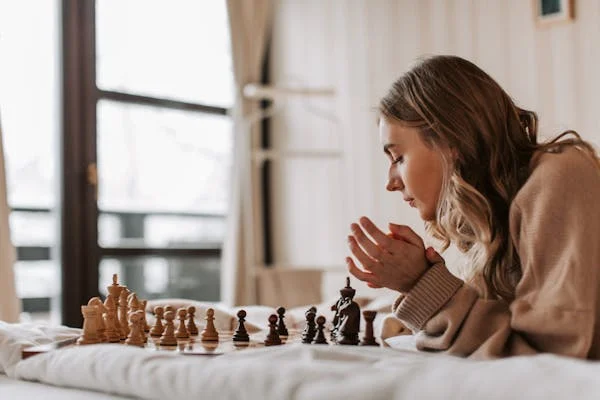
But here’s something most people don’t think about: online learning builds tech confidence. Students get comfortable using video platforms, handling digital tools, and learning independently—skills they’ll need in school, college, and future careers. It’s not just about chess; it’s about preparing kids for the real world.
Now, for coaching academies and chess businesses, going online means bigger reach. You’re no longer limited to students in your city. You can serve students in different time zones, offer group and private lessons, and scale your operations without spending on rent or travel. That’s more students, more impact, and better margins.
Here’s some advice if you’re a chess coach or school thinking of going online:
- Invest in clear curriculum design: Don’t wing it. Plan your lessons. Give homework. Track progress.
- Train your coaches to teach, not just play: Online teaching needs clarity, patience, and strong communication.
- Use simple tools well: Zoom, Google Classroom, and a good online board (like Lichess or Chess.com) are enough when used right.
- Build community: Host monthly tournaments, discussion groups, or game review sessions. Keep students engaged.
The future belongs to those who blend passion with technology—and online chess training is exactly that. It’s smart, scalable, and here to stay.
How Global School of Chess Leads the Online Chess Training Landscape
There are many online platforms out there. But most just show videos. Or give a few puzzles. They don’t teach the way Global School of Chess does.
Global School of Chess gives you:
- A real classroom experience
- Real human connection
- Real-time teaching
- Real tournaments
- Real growth
It’s like having the best chess school, right at your fingertips. Your child doesn’t just play. They learn. They grow. And they love every moment of it.
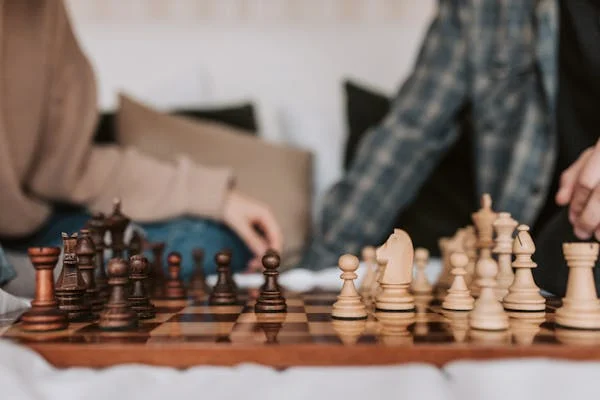
So if you’re in Doha, and you’re thinking about giving your child a gift that will last a lifetime—give them chess. And give it to them through the best platform there is.
👉 Click here to get started with a free trial class
Let your child dream big. Let them start with one move.
Wrapping It Up
Choosing the right chess academy is a big decision. It’s not just about learning how the pieces move. It’s about helping your child become a clear thinker, a patient learner, and a confident decision-maker—both on the chessboard and in life.

